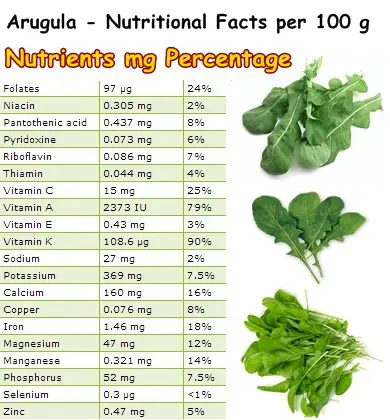A leafy green member of the Brassicaceae family, arugula or rocket (Eruca sativa) is a popular salad and garden vegetable. Arugula has a slightly pungent aroma which goes perfectly with many salad vegetables and fruits. Italian cuisine advises scattering it on pizza in more than generous amounts alongside flavored mozzarella or even grated Parmesan cheese, combinations which will surely make your taste buds go bananas. Arugula or rocket is native to the sun-kissed Mediterranean regions, where it thrives.
Scientifically known as Eruca sativa, arugula is a beautiful, green vegetable, with elongated, veined leaves. When the plant is still young, it resembles spinach. Arugula has a rather fast growth and can reach 2-3 feet in height.
The plant can be adapted to temperate regions as well and it is a known fact that colder weather makes it lose some of its spiciness. Both the leaves and the flowers can be safely eaten and the leaves can be harvested as soon as 3-4 weeks.
But more important, arugula is a complex vegetable, rich in vitamins, minerals and antioxidants.

Nutrition facts and benefits of Arugula
Arugula salad is a favorite dish in the Mediterranean region, as well as a wonderful source of phytochemicals such as thiocyanates, sulforaphane and isothiocyanates. These potent antioxidant substances efficiently counteract the carcinogenic effects of estrogen and have cytotoxic effects on tumor cells. A regular consumption of arugula can do wonders for our health. Because of its incredibly high vitamin K content (90% of the RDI, recommended daily intake), arugula promotes strong, healthy bones and supports blood coagulation.
In addition to this, it is especially rich in vitamin A and contains 1424 micrograms of beta-carotene, a provitamin A carotenoid. Studies suggest that a diet rich in vitamin A and flavonoids offers great protection against both lung and mouth cancers. Moreover, a diet consisting of foods rich in vitamin A, such as arugula, is the key to a beautiful, healthy skin and great eyesight.
If eaten raw, arugula provides generous amounts of vitamin C too (15 mg per 100 g of leaves). Vitamin C is essential for the production of collagen and benefits skin most of all by improving its appearance and providing anti-aging effects. The vitamin further strengthens the immune system and contributes to a stronger immune response against infection and disease.

Arugula is a good source of B vitamins as well, especially vitamin B9 or folate. Vitamin B9 is of crucial importance because it prevents neural tube defects in newborns, provided the mother takes it before and during her pregnancy.
All of the B vitamins found in arugula, folate, niacin, pantothenic acid, pyridoxine, riboflavin and thiamine, are essential for optimal cellular and enzyme-based metabolic functioning and contribute to good digestion and energy production.
Arugula is also a great source of dietary minerals such as calcium, copper, iron, magnesium, manganese, phosphorus and zinc. Calcium helps strengthen bones. Iron prevents anemia, contributes to red blood cell formation and helps combat fatigue. Magnesium increases calcium absorption and ensures it deposits in bones rather than joints or heart valves. It also supports muscle activity, heart included. Last but not least, zinc strengthens the immune system.

Interesting fact: did you know that white spots on your fingernails are often (but not always) a sign of zinc deficiency? Although rocket does not boast overwhelming concentrations of vitamins and minerals, it actually contains almost all important nutrients, zinc included. This means a helping of arugula can provide the small percentage of a vitamin or mineral you might be missing in your diet and help combat deficiencies and associated symptoms, such as white spots on nails for example.
Arugula side effects and contraindications
Blood clotting
Like all green leafy vegetables, arugula is high in vitamin K. Vitamin K is known for its role in blood coagulation and, while healthy, intake of high vitamin K foods should be limited if you have a predisposition for developing blood clots, and if you are receiving anticoagulants for reducing blood clotting. So while you can definitely eat arugula, remember to limit intake.
Conclusion
Whether you add a handful of arugula to a mixed vegetable salad or on an appetizing pizza, you are definitely making the right choice for your health. Spicy and flavored, with a pleasant bitter aftertaste, this salad veggie is available in most supermarkets worldwide. If you have a passion for gardening, you can easily grow it at home. Not only will you have a savory, ready-to-eat green, but you will also be supplying your body with a variety of vitamins, minerals and antioxidants because arugula is a wonderfully healthy vegetable.
